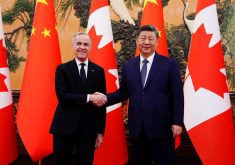The appointed board of Agriculture Minister Gerry Ritz’s CWB (formerly the Canadian Wheat Board) has finally made a move in this saga known as a transition towards privatization. It says it will give farmers a $5 stake in the “new company” for every tonne of wheat they sell through the CWB in the 2013-14 season.
As a farmer, I have to say that I am captivated by the idea that perhaps I will once more be allowed a voice in the say of the state of the CWB, which I had only two years ago when democratically farmer-elected representatives still ran the former CWB. Does this $5 fix mean that the Ritz appointees want to finally put control back into the hands of farmers by turning it into a co-operative?
Read Also

Deep cuts to ag research jeopardize Canada’s farming future
The huge cuts to ag research at Agriculture Canada are being widely panned by farm organizations, but there seems to be little hope of the government reversing its decision.
After all, Ritz earlier stated: “(The new CWB) could be a business corporation, a producer co-op, or a not-for-profit corporation. The business model will be for the board and farmers to decide.”
Or was this another smokescreen?
A $5 share for an entire tonne of grain gives a farmer as much control as playing “Roll up the Rim” at Tim’s.
Sources are saying the CWB board is only interested in giving farmers minority control of the organization while still seeking majority private control to increase their war chest. Of course if they used their imaginations, they could find a strong amount of capital through a “new-generation” co-operative model where farmers take equal majority control and investor shares are kept separate. Instead, this feels like another example of the big boys making sure this “farmers working together” thing doesn’t get out of hand.
We cannot forget that this five-person board is not a group of elected farmers, as was the case before Bill C-18. This board is appointed by, and is solely accountable to Minister Ritz.
That’s right, the same Gerry Ritz who said he respects the vote of farmers but then ignored the 62 per cent who wished to keep the single desk intact as a farmer-controlled entity.
So why would the CWB bring in equity shares if it isn’t moving towards a co-operative model? Some possibilities:
- They need more farmers to sign up in order to pay the bills.
- The $17.5-billion farmer-driven class-action lawsuit is still going through the courts. Prime Minister Harper and Mr. Ritz want to blow as much smoke as they can over the reality that farmers have lost big money with the federal decapitation of the CWB.
- Partnerships with grain companies aren’t working out as planned.
- Pinup girls, ignoring the support base, advertising ploys and football pools just aren’t attracting business.
- When the CWB buys grain at port from grain companies and then tries to sell it for a higher price across the ocean, it just looks bad to farmers if they don’t have any ownership in the process.
- Giving private companies all the earnings and assets of the CWB might be hard for the Competition Bureau to swallow all at once.
At the end of the day, we’re getting a sense from Gerry Ritz and his five stooges that they think farmers do not have the mental capacity to be given majority or co-operative control of a grain company. Or even worse, that he’s taking direction from the private grain companies and doesn’t want to ruffle those major Conservative supporters.
It’s time for the Ritz-appointed CWB board and the Conservatives to change face and stop offering up the CWB as a golden calf to private companies, as was done in Australia. That is a recipe for failure. It hurts on-farm sustainability and it weakens long-term rural community development by handing control over to international players.
Stop the smokescreens, Mr. Ritz. It’s time to clear the air.













